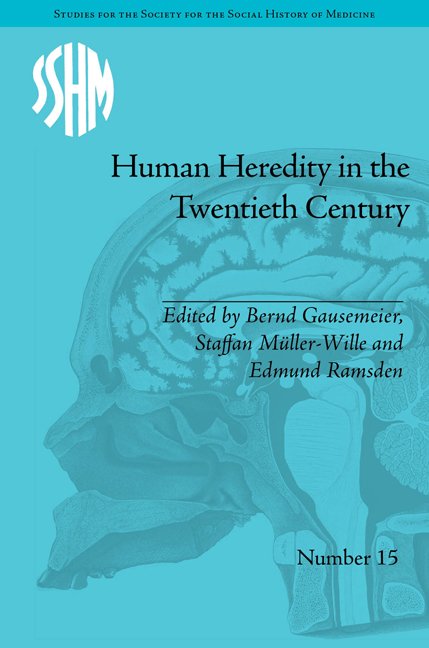Book contents
- Frontmatter
- Contents
- Acknowledgements
- List of Contributors
- List of Figures and Tables
- Introduction: Human Heredity in the Twentieth Century
- Part I Constructing Surveys of Heredity
- Part II Blood and Populations
- Part III Human Heredity in the Laboratory
- 8 From Agriculture to Genomics: The Animal Side of Human Genetics and the Organization of Model Organisms in the Longue Durée
- 9 Cereals, Chromosomes and Colchicine: Crop Varieties at the Estación Experimental Aula Dei and Human Cytogenetics, 1948–58
- 10 Putting Human Genetics on a Solid Basis: Human Chromosome Research, 1950s–1970s
- Part IV Understanding and Managing Disease
- Part V Reconstructing Discipline(s)
- Notes
- Index
8 - From Agriculture to Genomics: The Animal Side of Human Genetics and the Organization of Model Organisms in the Longue Durée
from Part III - Human Heredity in the Laboratory
- Frontmatter
- Contents
- Acknowledgements
- List of Contributors
- List of Figures and Tables
- Introduction: Human Heredity in the Twentieth Century
- Part I Constructing Surveys of Heredity
- Part II Blood and Populations
- Part III Human Heredity in the Laboratory
- 8 From Agriculture to Genomics: The Animal Side of Human Genetics and the Organization of Model Organisms in the Longue Durée
- 9 Cereals, Chromosomes and Colchicine: Crop Varieties at the Estación Experimental Aula Dei and Human Cytogenetics, 1948–58
- 10 Putting Human Genetics on a Solid Basis: Human Chromosome Research, 1950s–1970s
- Part IV Understanding and Managing Disease
- Part V Reconstructing Discipline(s)
- Notes
- Index
Summary
History of science and science studies have become increasingly interested in models and modelling processes in recent years. One reason for this is the awareness that the understanding of experimental science begins with the understanding of experimental practice. As scholars have long recognized, reasoning through experimental animals became the lingua franca of biologists entering the twentieth century, and the choice of organism has proven critical to scientific development. From an epistemological point of view, this kind of reasoning is far more complex than it may seem at first glance. This is because animals are not the only ‘ingredient’ needed in modelling: ‘Model organisms can be seen as a specialized subset of the more general class of model systems, where the latter usually encompassed not only the organism but also the techniques and experimental methodologies surrounding the organism’.
Historically speaking, the mode and experimental arrangement of models has changed significantly since the emergence of organized experimental biology. Cheryl Logan has described how nineteenth-century rationales for the choice of test organisms in physiology were transformed after 1900. This change was driven by various developments in biological thought and theory, the requirements of the experimental method and new technologies of experimentation. As a consequence of the formation of Mendelian genetics, geneticists and physicians alike sought to contribute experimentally to the understanding of human heredity with respect to medical problems.
- Type
- Chapter
- Information
- Human Heredity in the Twentieth Century , pp. 113 - 126Publisher: Pickering & ChattoFirst published in: 2014



